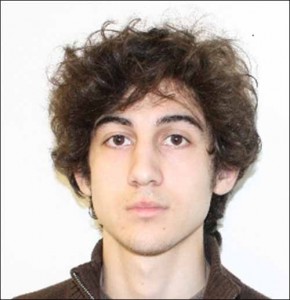
Dzhokhar Tsarnaev, 19, and his 26-year-old brother Tamerlan allegedly set off two bombs at the Boston Marathon last week, killing three and wounding 264.
ORDINARY CITIZENS PLAY MAJOR ROLE
HELPING TO KEEP SPORTING EVENTS,
PUBLIC GATHERINGS & TRAVEL SAFE
Not enough credit is given to the average Joe
By David Maril
The governor of Massachusetts, mayor of Boston, and high-ranking officials from the various law enforcement agencies basked in the glory last week of the announcement that terrorist suspect Dzhokhar Tsarnaev had been taken into custody.
No question, the bravery, tenacity and teamwork of the FBI, state police, and Boston city police, utilizing the latest in scientific surveillance technology, was a major factor in tracking down the two Chechen suspects accused of setting off bombs at the Boston Marathon that killed three and injured more than 260 on Patriots’ Day, many of whom lost legs as a result of the attack.
However, lost in all the self-congratulatory press-conference rhetoric is the assistance of so many diligent, responsible and caring ordinary citizens. It’s a team effort all the way and too often the crucial contributions from conscientious people are minimized or overlooked.
I was complaining on the phone the other day to a media friend in Massachusetts about officials and politicians taking too much credit all the time but running for cover whenever there is blame. His wife works in Boston near the Marathon finish line. His answer was that you have to expect that: It’s the way it always is.
Well, I don’t think this is right and too often the media is too quick to go along with it. Whether it’s in the world of academics, with the head of a college department not giving recognition to a student who did all the work on an important research project, or security officials downplaying the role of the public in catching a suspect, credit should be distributed equitably.
Remember back in 2001, Richard Reid, the Shoe Bomber? He somehow made it through the different layers of airport security to board an American Airlines flight headed from Paris to Miami, with the hope of detonating explosives in his shoes. Passengers, seeing what he was attempting to do, subdued him and held him prisoner until he could be arrested.
COULDN’T HANDLE THE JOB OF A SCHOOL SAFETY
When asked if there had been a breach in security after the Shoe Bomber incident, Homeland Security Secretary Janet Napolitano, who couldn’t handle the job of a school safety at a rural traffic crossing, answered that his capture showed, “The system worked.”
Yes, the system worked. But it worked despite the ineffectiveness of the screening process and only because of the alertness of the passengers.
The recent capture of Dzhokhar Tsarnaev is another striking example. It occurred because of the diligence and courage of Watertown resident David Henneberry.
Law enforcement officials had been looking in the wrong areas of Watertown all day. They had even decided there was a strong possibility the suspect had left the city, and began to release the Boston area from its lockdown mode.
Henneberry, who came out of his house after the lockdown was halted, noticed the covering on his boat in the backyard had a tear in it. He investigated and discovered a bloodied man hiding in the boat. If he hadn’t made the discovery and notified the authorities, Tsarnaev would have either died overnight in the boat or escaped to cause more problems.
HENNEBERRY’S ASSISTANCE SHOULD HAVE BEEN EMPHASIZED
It would have been fitting if Henneberry’s assistance had been emphasized more in the Friday night press conference and there had been greater recognition of all the people who cooperated for days with the law enforcement officials. The Boston Marathon spectators who helped treat victims after the bombings, saving so many lives, deserve their own press conference and medals of honor.
More focus needs to be given to the concept of teamwork. Despite some criticism of the TSA (U.S. Transportation Security Administration) at airports, there’s no question that it’s safer to fly today than it was before 9/11. When you take a flight out of BWI for example, or any airport, you need a government-issued identification photograph just to even reach the screening area. Luggage is also examined more carefully than it used to be.
The doors separating the passenger cabin and the cockpit of airplanes have been fortified and remain locked during flights, making it a lot more difficult for an intruder to overpower the pilots. Most importantly, passengers are also on the alert and are apt, after the 9/11 tragedies, to notice and react to any behavior that appears to be suspicious.
IMPORTANT FOR PASSENGERS TO BE ALERT
Because the security for Amtrak and MARC train travel is not as tight, it’s even more important for passengers to be alert to suspicious behavior on trains.
Travel by rail is tougher to regulate than airplane travel. The most troubling part is an absence of comprehensive passenger and luggage screening. There aren’t any easy solutions. It would cost billions to implement a rail system to screen luggage and passengers.
What’s more, there’s a defeatist attitude among government officials and politicians that rail security is impractical and impossible. Any system designed to move so many people so quickly is going to be very difficult to secure, forcing schedule delays.
There’s no added price tag, however, on all of us helping keep the transportation systems and crowded public events safe with diligence and responsible behavior.
Secretary Napolitano is right when she says the system works. However, what she and too many pompous politicians and incompetent political appointees fail to acknowledge is the role the public plays in the success of helping maintain the freedoms we all cherish.
These heroes, like the ones in Boston, deserve recognition. And our undying gratitude.
davidmaril@hermanmaril.com
READ LAST WEEK’S “INSIDE PITCH” COLUMN (ON MARTIN O’MALLEY): click here






May 3rd, 2013 - 6:42 AM
[…] are noisy. davidmaril@hermanmaril.com READ LAST WEEK’S “INSIDE PITCH” COLUMN: click here Filed under: Top Stories Comment […]